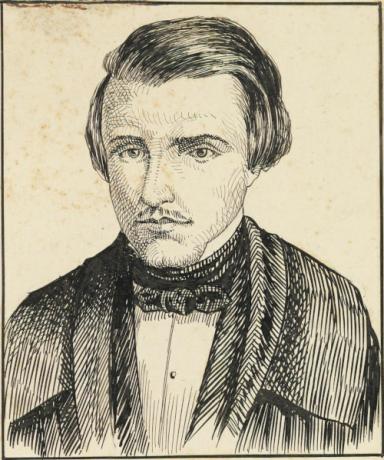Narcissus
Inside me I wanted to see. trembled,
Folded in two over my own well...
Ah, what a terrible face and what a framework
This languid body of mine hid!
O tomb mouth, closed and cold,
Whose sphinx silence I hear well!
O beautiful young man's eager eyes,
On a forehead sweating melancholy!
That's how I wanted myself in these images.
My exquisite and wild poems,
My Desire furrows them in red:
That I live waiting for this strange night,
Night of love where I enjoy and have,
...Down at the bottom of the well that I look up to!
José Régio
The poem you read now is by the Portuguese writer José Régio, one of the greatest exponents of Portuguese literature, founder and director of the acclaimed Revista Presença, the most successful literary publication during the years of modernism in Portugal. The art and criticism sheet began to circulate on March 10, 1927, spreading the ideals of Presence, an aesthetic movement that marked the second phase of Portuguese modernism.
Successor of Orpheu Magazine, founded by the writers
Fernando Pessoa, Mario de Sá-Carneiro and Almada Negreiros (among others) in 1915, Revista Presença had as its main objective to insert Portugal in the cultural context of Modern Europe, promoting in the country the main names of foreign literatures that until then were unknown or neglected. It was, in this way, one of the most influential and long-lived literary bodies in Portugal, fighting the provincialism of the Portuguese cultural panorama by enabling cultural and aesthetic exchange with others literatures.True Originality and False Originality
In Art, everything that is original is alive. Everything that comes from the most virgin, truest and most intimate part of an artistic personality is original. The first condition of a living work is therefore to have a personality and to obey it. Now how what personalizes an artist is, at least superficially, what differentiates him from the others, (artists or not) a certain synonymy was born between the original adjective and many others, at least superficially related; for example: the adjective eccentric, weird, extravagant, bizarre... This is how all calculated and cunning originality is false.
This is how dead literature also belongs to the one in which an author pretends to be original without a personality of his own. Eccentricity, extravagance and bizarreness can be powerful - but only when natural to a given artistic temperament. On top of other qualities, the product of these temperaments will have the charm of the rare and the unexpected. Affected, such qualities will be no more than a literary trick.
(José Régio, in 'Presença, Folha de Arte e Crítica, first edition, 03/10/1927)
Unlike the Orphism (whose ideals are very similar to the first phase of Brazilian modernism), which fought the pastism and traditionalism of the current literary aesthetic, looking to the man and his condition in the modern world, Presence has created an introspective and intimate literature, very close to the theories of the human unconscious defended by Sigmund Freud. Proust and Dostoevsky were the main influences of presentist writers, names that imprinted a strong psychologizing trait in their works. It was these characteristics that made Presence the target of harsh criticism, criticism that accused its representatives of produce an alienated literature, alien to the serious political and economic crises faced by Europe at the end of the second decade of the century XX.
Do not stop now... There's more after the advertising ;)
Identity
I killed the moon and the diffused moonlight.
I want the iron and cement verses.
And instead of rhymes, I use
The consonances that exist in suffering.
Universal and open, my instinct kicks in
To every heart that struggles afflicted.
And fight as you know and how you can:
It gives beauty and meaning to every cry.
But as the inscriptions on the cliffs
Have longer duration,
I spend the hours and days
Hardening the form of emotion.
Miguel Torga
Among the main authors of the period stand out José Régio, Miguel Torga, João Gaspar Simões, Adolfo Casais Monteiro and Branquinho da Fonseca, writers involved with the aesthetic program of Presence that had as one of its ideals to interrogate the meaning of human existence, far from academicism and the ideologizing program spread by the Orphism. According to the group's manifesto, written by José Régio (considered the great theorist among the presenters), “the Art's purpose is only to produce for us this emotion so particular, so mysterious, and perhaps so complex: the emotion aesthetics”. Although they recognized the importance of Orphism, presentist writers sought poetry that excelled at the individual, associating it with a conception of metaphysical and abstract art in which subjectivity was more important than objective truth or rational.
Presence was the most important literary current in Portuguese literature until 1940, when the last edition of the Revista Presença was published. The great merit of the presentist writers was certainly to publicize the achievements of the first modernist generation - as did the representatives of the second generation of Brazilian modernism — thus consolidating a new literary aesthetic and opening the doors to the movement that would come next, Neorealism, third phase of Portuguese modernism that was strongly influenced by the regionalist novel Brazilian.
By Luana Castro
Graduated in Letters



